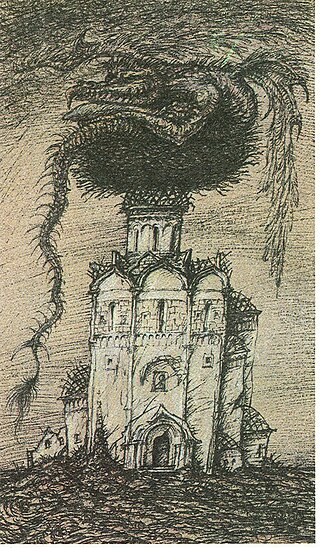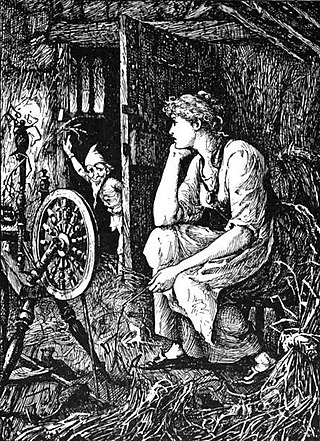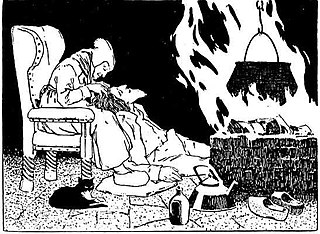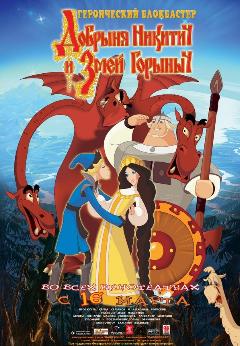
Grand Duchess Tatiana Nikolaevna of Russia was the second daughter of Tsar Nicholas II, the last monarch of Russia, and of Tsarina Alexandra. She was born at Peterhof Palace, near Saint Petersburg.

Marko Mrnjavčević was the de jure Serbian king from 1371 to 1395, while he was the de facto ruler of territory in western Macedonia centered on the town of Prilep. He is known as Prince Marko and King Marko in South Slavic oral tradition, in which he has become a major character during the period of Ottoman rule over the Balkans. Marko's father, King Vukašin, was co-ruler with Serbian Tsar Stefan Uroš V, whose reign was characterised by weakening central authority and the gradual disintegration of the Serbian Empire. Vukašin's holdings included lands in north-western Macedonia and Kosovo. In 1370 or 1371, he crowned Marko "young king"; this title included the possibility that Marko would succeed the childless Uroš on the Serbian throne.

"Beauty and the Beast" is a fairy-tale written by French novelist Gabrielle-Suzanne Barbot de Villeneuve and published in 1740 in La Jeune Américaine et les contes marins.

The StoryTeller is a live-action/puppet television series that originally aired in 1987 and which was created and produced by Jim Henson.

A Slavic dragon is any dragon in Slavic mythology, including the Russian zmei, Ukrainian zmiy, and its counterparts in other Slavic cultures

The Langs' Fairy Books are a series of 25 collections of true and fictional stories for children published between 1889 and 1913 by Andrew Lang and his wife, Leonora Blanche Alleyne. The best known books of the series are the 12 collections of fairy tales also known as Andrew Lang's "Coloured" Fairy Books or Andrew Lang's Fairy Books of Many Colors. In all, the volumes feature 798 stories, besides the 153 poems in The Blue Poetry Book.

"The Devil and his Grandmother" or "The Dragon and His Grandmother" is a German fairy tale collected by the Brothers Grimm, number 125. According to Jack Zipes, the source of the story was Dorothea Viehmann, the wife of a tailor from Hesse.

"The Devil with the Three Golden Hairs" is a German fairy tale collected by the Brothers Grimm. It falls under Aarne–Thompson classification types 461, and 930.
"The King Who Would Be Stronger Than Fate" is an Indian fairy tale, included by Andrew Lang in The Brown Fairy Book.
Fair, Brown and Trembling is an Irish fairy tale collected by Jeremiah Curtin in Myths and Folk-lore of Ireland and Joseph Jacobs in his Celtic Fairy Tales.

Dobrinya and the Dragon is a Russian traditionally animated feature film directed by Ilya Maksimov, made by Melnitsa Animation Studio. It opened in Russia on March 15, 2006. It is the second film in Melnitsa's The Three Bogatyrs series the first was Alyosha Popovich and Tugarin Zmey.
"The Three Sisters" or Green Meadow is an Italian literary fairy tale written by Giambattista Basile in his 1634 work, the Pentamerone. It tells the story of a maiden having secret encounters with a prince with the use of magic, him almost losing his life and her having to search for a cure for him.
The Green Snake and the Beautiful Lily is a fairy tale by Johann Wolfgang von Goethe published in 1795 in Friedrich Schiller's German magazine Die Horen. It concludes Goethe's novella rondo Conversations of German Emigrants (1795). Das Märchen is regarded as the founding example of the genre of Kunstmärchen, or artistic fairy tale. The story revolves around the crossing and bridging of a river, which represents the divide between the outer life of the senses and the ideal aspirations of the human being.
Baithéne mac Brénaind was an Irish monk, one of Saint Columba's followers who accompanied him to Scotland around 563, and was the first successor as Abbot of Iona Abbey. The Annals of Tigernach record his birth in 534, and his death was likely between 596 and 598 according also to the Annals of Ulster. Irish genealogical records indicate him to be the "son of Brendan, son of Fergus, son of Conall Gulban, son of Niall Noígiallach", thus being a member of the Cenél Conaill branch of the Northern Uí Néill, as the abbots of Iona Abbey following the death of Columba often were.
"Snow Falls" is the third episode of the American fairy tale/drama television series Once Upon a Time. The series takes place in the fictional seaside town of Storybrooke, Maine, in which the residents are actually characters from various fairy tales that were transported to the "real world" town by a powerful curse. This episode centers on the first meeting of Snow White and Prince Charming, when the former steals his mother's ring; Charming hunts her down, but they later part amicably. Meanwhile, Snow's Storybrooke counterpart, Mary Margaret (Goodwin), develops a personal bond with a comatose John Doe (Dallas) while reading him fairy tales. During the night, he awakens and escapes the hospital; Mary Margaret locates the amnesiac man, but is dismayed to learn that he is married.

The Scarlet Flower, also known as The Little Scarlet Flower or The Little Red Flower, is a Russian literary fairy tale written by Sergey Aksakov. It is a variation of the plot of the fairy tale Beauty and the Beast. In Russia, Beauty and the Beast story is known mostly via Aksakov's retelling.
The Three Bogatyrs is a Russian animated franchise produced by Melnitsa Animation Studio. The films feature the voices of Sergey Makovetsky, Dmitry Vysotsky, Liya Medvedeva, Valery Soloviev, Oleg Kulikovich, Oleg Tabakov, Anatoly Petrov, Andrei Tolubeyev and Fyodor Bondarchuk with Elizaveta Boyarskaya. The overarching plot throughout the series follows the adventures of three bogatyrs: Alyosha Popovich, Dobrynya Nikitich and Ilya Muromets.

The Adventures of Pinocchio is a 1972 Italian five-part miniseries directed by Luigi Comencini, which originally aired weekly on Rai 1 between April 8 and May 6, 1972. Based on Carlo Collodi's 1883 novel with the same name, the miniseries received a large critical success, and had an average of twenty-one and a half million viewers during its first airing. All the episodes together make up 280 minutes of runtime.
A Zmei Gorynich or zmei, in skazki and byliny, is a dragon or serpent, or sometimes a human-like character with dragon-like traits.
Yasmin and the Serpent Prince is a Persian folktale published in 1974 by author Forough Hekmat. It is related to the international cycle of the Animal as Bridegroom or The Search for the Lost Husband, in that a human princess marries a supernatural husband or man in animal form, loses him and has to seek him out.










